Exam 3: Interdependence and the Gains from Trade.
Exam 1: Ten Principles of Economics.349 Questions
Exam 2: Thinking Like an Economist.535 Questions
Exam 3: Interdependence and the Gains from Trade.443 Questions
Exam 4: The Market Forces of Supply and Demand.571 Questions
Exam 5: Elasticity and Its Application510 Questions
Exam 6: Supply, Demand, And Government Policies.557 Questions
Exam 7: Consumers, Producers, and the Efficiency of Markets.460 Questions
Exam 8: Application: The Costs of Taxation.424 Questions
Exam 9: Application: International Trade.410 Questions
Exam 10: Externalities.441 Questions
Exam 11: Public Goods and Common Resources.349 Questions
Exam 12: The Design of the Tax System.478 Questions
Exam 13: The Costs of Production.533 Questions
Exam 14: Firms in Competitive Markets.478 Questions
Exam 15: Monopoly.526 Questions
Exam 16: Monopolistic Competition.497 Questions
Exam 17: Oligopoly.410 Questions
Exam 18: The Market For the Factors of Production.463 Questions
Exam 19: Earnings and Discrimination.398 Questions
Exam 20: Income Inequality and Poverty.374 Questions
Exam 21: The Theory of Consumer Choice.462 Questions
Exam 22: Frontiers in Microeconomics.353 Questions
Select questions type
Figure 3-11
The graph below represents the various combinations of ham and cheese (in pounds) that the nation of Bonovia could produce in a given month.
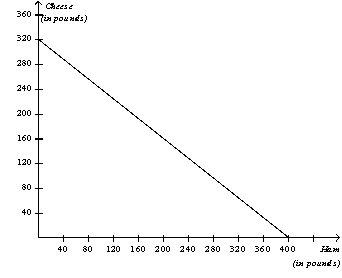 -Refer to Figure 3-11.In the nation of Cropitia,the opportunity cost of a pound of ham is 0.3 pounds of cheese.Bonovia and Cropitia both can gain from trading with one another if one pound of ham trades for
-Refer to Figure 3-11.In the nation of Cropitia,the opportunity cost of a pound of ham is 0.3 pounds of cheese.Bonovia and Cropitia both can gain from trading with one another if one pound of ham trades for
(Multiple Choice)
4.8/5  (38)
(38)
Figure 3-9
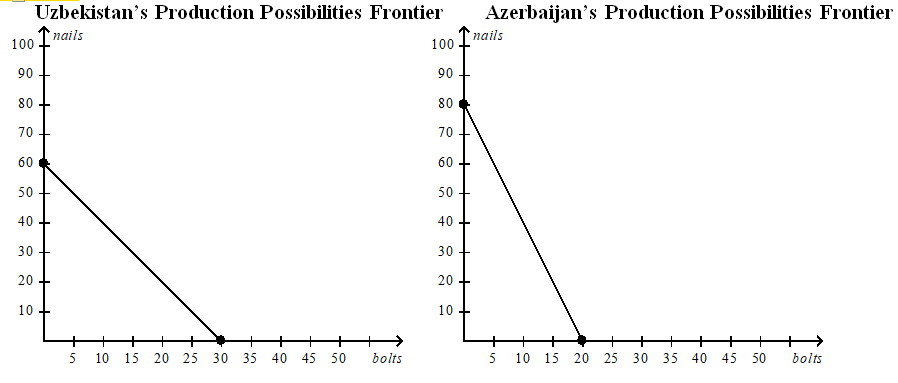 -Refer to Figure 3-9.Suppose Azerbaijan is willing to trade 3 nails to Uzbekistan for every bolt that Uzbekistan makes and sends to Azerbaijan.Which of the following combinations of bolts and nails could Azerbaijan then consume,assuming Uzbekistan specializes in making bolts and Azerbaijan specializes in making nails?
-Refer to Figure 3-9.Suppose Azerbaijan is willing to trade 3 nails to Uzbekistan for every bolt that Uzbekistan makes and sends to Azerbaijan.Which of the following combinations of bolts and nails could Azerbaijan then consume,assuming Uzbekistan specializes in making bolts and Azerbaijan specializes in making nails?
(Multiple Choice)
4.7/5  (24)
(24)
Table 3-5
Assume that England and Spain can switch between producing cheese and producing bread at a constant rate.
 -Refer to Table 3-5.We could use the information in the table to draw a production possibilities frontier for England and a second production possibilities frontier for Spain.If we were to do this,measuring bread along the horizontal axis,then
-Refer to Table 3-5.We could use the information in the table to draw a production possibilities frontier for England and a second production possibilities frontier for Spain.If we were to do this,measuring bread along the horizontal axis,then
(Multiple Choice)
4.8/5  (34)
(34)
Figure 3-2
Peru's Production Possibilities Frontier
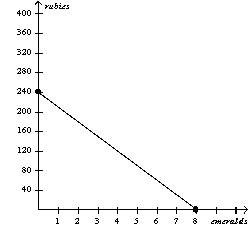 -Refer to Figure 3-2.If the production possibilities frontier shown is for 40 hours of production,then how long does it take Peru to make one ruby?
-Refer to Figure 3-2.If the production possibilities frontier shown is for 40 hours of production,then how long does it take Peru to make one ruby?
(Multiple Choice)
4.9/5  (33)
(33)
Figure 3-8
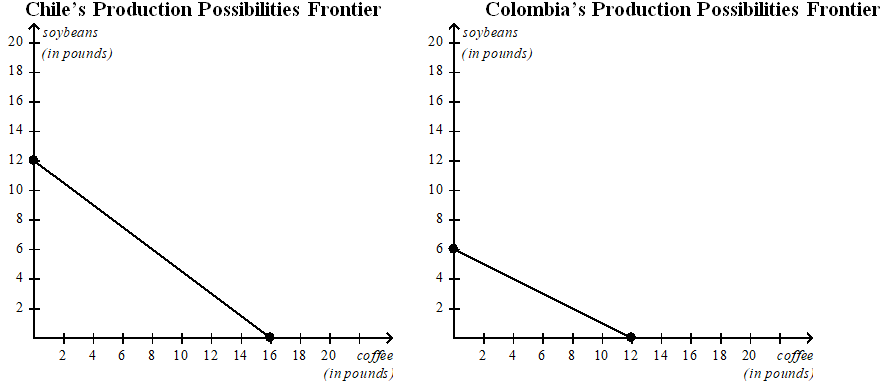 -Refer to Figure 3-8.If the production possibilities frontiers shown are each for one day of production,then which of the following combinations of pounds of coffee and pounds of soybeans could Chile and Colombia together not make in a given day?
-Refer to Figure 3-8.If the production possibilities frontiers shown are each for one day of production,then which of the following combinations of pounds of coffee and pounds of soybeans could Chile and Colombia together not make in a given day?
(Multiple Choice)
4.8/5  (29)
(29)
Figure 3-5
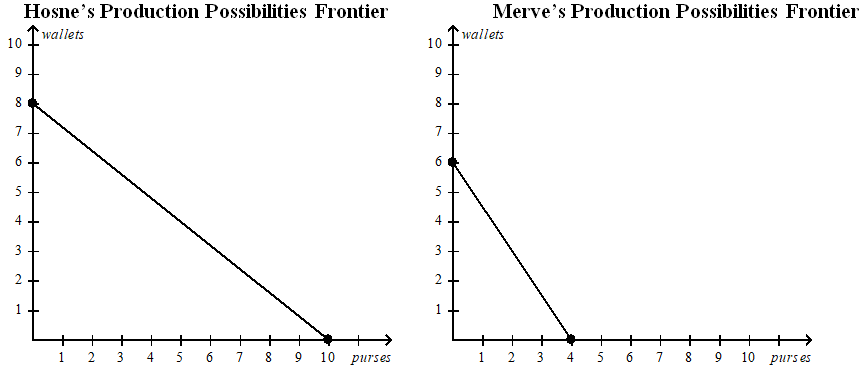 -Refer to Figure 3-5.If Hosne must work 0.5 hour to make each purse,then her production possibilities frontier is based on how many hours of work?
-Refer to Figure 3-5.If Hosne must work 0.5 hour to make each purse,then her production possibilities frontier is based on how many hours of work?
(Multiple Choice)
4.8/5  (25)
(25)
Table 3-5
Assume that England and Spain can switch between producing cheese and producing bread at a constant rate.
 -Refer to Table 3-5.Which of the following combinations of cheese and bread could England not produce in 40 hours?
-Refer to Table 3-5.Which of the following combinations of cheese and bread could England not produce in 40 hours?
(Multiple Choice)
4.9/5  (31)
(31)
Table 3-10
Juanita and Shantala run a business that programs and tests cellular phones. Assume that Juanita and Shantala can switch between programming and testing cellular phones at a constant rate. The following table applies.
 -Refer to Table 3-10.Juanita's opportunity cost of testing one cellular phone is programming
-Refer to Table 3-10.Juanita's opportunity cost of testing one cellular phone is programming
(Multiple Choice)
4.7/5  (29)
(29)
Figure 3-7
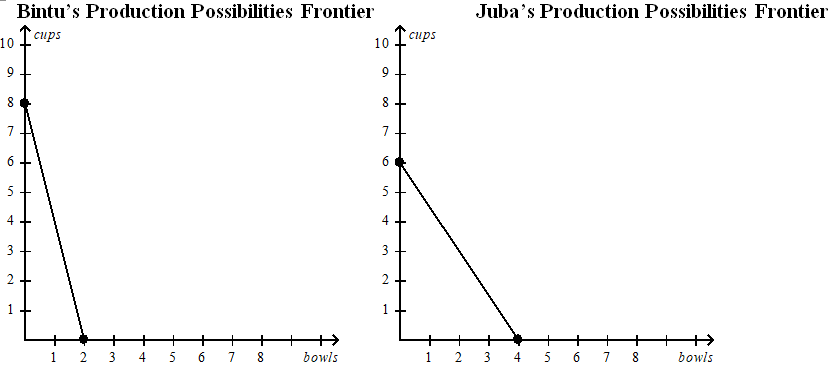 -Refer to Figure 3-7.The opportunity cost of 1 cup for Bintu is
-Refer to Figure 3-7.The opportunity cost of 1 cup for Bintu is
(Multiple Choice)
4.9/5  (37)
(37)
Figure 3-10
Alice and Betty's Production Possibilities in one 8-hour day.
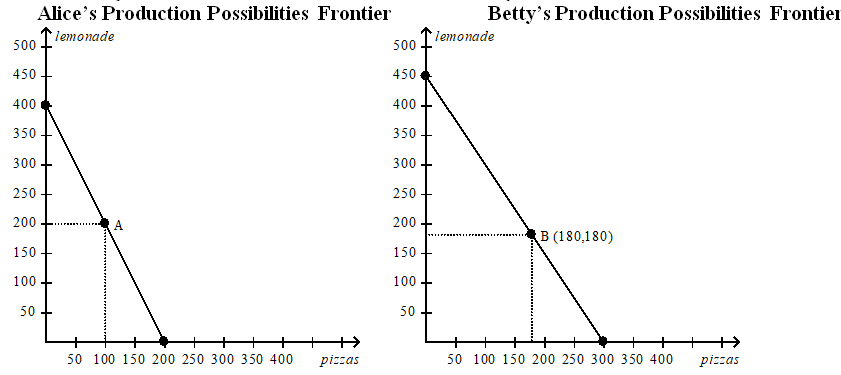 -Refer to Figure 3-10.Which of the following prices would result in an mutually advantageous trade for Alice and Betty?
-Refer to Figure 3-10.Which of the following prices would result in an mutually advantageous trade for Alice and Betty?
(Multiple Choice)
4.8/5  (34)
(34)
Total output in an economy increases when each person specializes because
(Multiple Choice)
4.8/5  (37)
(37)
Specialization and trade can make everyone better off if a person can obtain goods at prices that are less than that person's opportunity cost.
(True/False)
4.9/5  (35)
(35)
Trade allows a person to obtain goods at prices that are less than that person's opportunity cost because each person specializes in the activity for which he or she has the lower opportunity cost.
(True/False)
4.7/5  (34)
(34)
Fred trades 2 tomatoes to Barney in exchange for 1 pumpkin.Fred and Barney both gain from the exchange.We can conclude that,for Barney,the opportunity cost of producing 1 pumpkin is greater than 2 tomatoes.
(True/False)
4.9/5  (44)
(44)
Absolute advantage is found by comparing different producers'
(Multiple Choice)
4.9/5  (34)
(34)
Table 3-4
Assume that the farmer and the rancher can switch between producing meat and producing potatoes at a constant rate.
 -Refer to Table 3-4.Assume that the farmer and the rancher each has 24 labor hours available.If each person divides his time equally between the production of meat and potatoes,then total production is
-Refer to Table 3-4.Assume that the farmer and the rancher each has 24 labor hours available.If each person divides his time equally between the production of meat and potatoes,then total production is
(Multiple Choice)
4.7/5  (28)
(28)
Table 3-4
Assume that the farmer and the rancher can switch between producing meat and producing potatoes at a constant rate.
 -Refer to Table 3-4.Which of the following combinations of meat and potatoes could the rancher not produce in 24 hours?
-Refer to Table 3-4.Which of the following combinations of meat and potatoes could the rancher not produce in 24 hours?
(Multiple Choice)
4.9/5  (37)
(37)
Suppose that a worker in Agland can produce either 10 units of organic grain or 2 units of incense per year,and a worker in Zenland can produce either 5 units of organic grain or 15 units of incense per year.There are 20 workers in Agland and 10 workers in Zenland.Currently the two countries do not trade.Agland produces and consumes 100 units of grain and 20 units of incense per year.Zenland produces and consumes 50 units of grain and no incense per year.If each country made the decision to specialize in producing the good in which it has a comparative advantage,then the combined yearly output of the two countries would increase by
(Multiple Choice)
4.9/5  (35)
(35)
Showing 381 - 400 of 443
Filters
- Essay(0)
- Multiple Choice(0)
- Short Answer(0)
- True False(0)
- Matching(0)